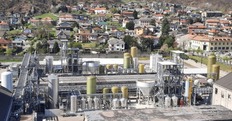- The new plant has an annual capacity of 25,000 tons of chlorine and 80,000 tons of potassium hydroxide.
- The 45 million Euro investment plan began two years ago and overcame challenges like the Covid-19 pandemic and a flood.
- Key upgrades include remediation of the old mercury plant, new electrolysis and chlorination plants, and railway reconstruction.
- The site now ranks third in the EU for potassium hydroxide production, with 270,000 tons per year.

New Plant Overview
A new plant for producing chlorine and potassium hydroxide has started operations in Pieve Vergonte, Italy. The facility, part of a 45 million Euro investment plan, has an annual capacity of 25,000 tons of chlorine and 80,000 tons of potassium hydroxide in 50% aqueous solution.
Investment and Upgrades
The investment plan, initiated two years ago, included several key upgrades: remediation of the old mercury plant, reconstruction of the railway junction, restructuring of the liquid chlorine and hydrochloric acid production plants, and the construction of new electrolysis and chlorination plants. Despite challenges like the Covid-19 pandemic and a flood in October 2020, the plan progressed as scheduled.
Production Capacity
With the new plant operational, the site now ranks third in the European Union for potassium hydroxide production, with a total capacity of 270,000 tons per year. Over 100,000 tons will be used internally for producing potassium carbonate, potassium metabisulphite, and other derivatives.
Quality Standards
The plant is designed to meet high-quality standards, particularly in terms of purity, making its output suitable for pharmaceutical and food applications. The focus on minimizing chlorates and chlorides in the potassium hydroxide ensures its suitability for these sensitive industries.
Historical Context
The site, originally established in 1915, faced potential closure in 2017 due to obsolescence and non-compliance with new European regulations banning mercury in electrochemical cycles. The acquisition and subsequent investment by Esseco Group have revitalized the site, securing jobs and ensuring its future viability.

